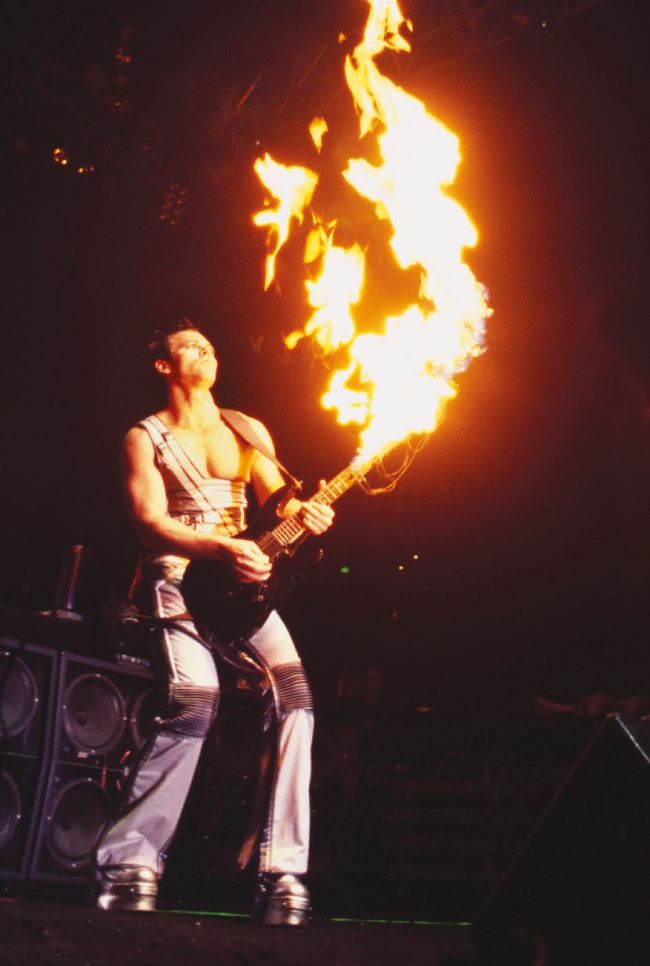RAMMSTEIN
HOW MUTTER CHANGED THE GAME
With two albums under their leather belts and the gag between their teeth, Rammstein had a point to prove. Twenty years on, this is how Mutter made them megastars
WORDS: ALEC CHILLINGWORTH

PRESS/OLAF HEINE
The headline screamed, ‘Nazis? Heil no!’ This wasn’t one of the usual outrageous tabloid rags, though – this was a mainstream UK music publication. Why? The year was 1998 and a band had used footage of Leni Riefenstahl’s 1938 film, Olympia, in their latest music video –a cover of Depeche Mode’s Stripped. While originally created as propaganda for the infamous ‘Nazi Olympics’, the movie is now routinely name-checked as a vital moment in cinematic history. But the band in question were German, sparking fears of fascism.
It was Rammstein: the Berlin six-piece who’d lived under hardline socialist rule in the German Democratic Republic. The staunchly liberal band.
The band with the fire. The band with the dildos. But Britain didn’t know all that yet…
“We are not Nazis, Neo-Nazis, or any other kind of Nazi,” said the band emphatically in a statement quoted in the piece, stating that the footage was used as an example of good art. “We are against racism, bigotry or any other type of discrimination.”
It was a strange start for a band who were about to embark on an effort to win over Britain. “They were convinced it would never happen in the UK,” says Anna Maslowicz, the PR guru who took Rammstein under her wing a year or so after that headline. “The first time I met them, I said, ‘You’re gonna be playing stadiums in the future.’ And they said, ‘Never. We’ll never be accepted here. We sing in German.’”
That admission seems surprising in light of how things were going for the band. While their debut album, 1995’s Herzeleid, flopped onto CD players and was met with a somewhat flaccid reception, it caught the ear of Nine Inch Nails’ Trent Reznor and filmmaking legend David Lynch – they loved it so much, two songs ended up on Lynch’s 1997 neo-noir cinematic nightmare, Lost Highway.
Album Nummer zwei, Sehnsucht, booted the door down later that year. Its lead single, Engel, reached No.3 in the German singles charts. Up next was Du Hast, now a setlist staple, which somehow became a US radio hit and pipped The Smashing Pumpkins to a heavy rotation slot on MTV.
They were playing to thousands of devotees in mainland Europe and blowtorching a serious reputation across the pond. Thorsten Zahn, former editor of German alternative magazine Visions and the current editor-in-chief at Metal Hammer Germany, was sold hook, line and sphincter from day one. But as Rammstein hunkered down to make the album that would become Mutter, a seed of doubt sprouted in his brain: how could the band exceed expectations again?

Richard takes out the eyebrows of the first eight rows
GETTY
“Everyone was afraid which direction they’d go next,” he says of the band’s Deutsche fanbase. “Everyone was nervous that the third record would turn out bad.”
There was one man who definitely wasn’t nervous: Jacob Hellner. The Swedish producer had already worked with the band on Herzeleid and Sehnsucht, and would continue to produce every record save for 2019’s self-titled. He remembers the mid-1999 gestation period of Rammstein’s defining chapter.
“[With] how the music world worked back in those days, your third album would define whether you were there to stay or just a flash in the pan,” he explains. “They realised that, and even though they’d had massive hits with Sehnsucht, they still had the bravery to follow their artistic instinct and go where they went.
“They rented Haus Weimar in Heiligendamm, a small town by the Baltic Sea,” he continues. “It was a hangout for the East German political top brass, and in those days, it was really worn down – they rented the caretaker’s house. The whole foundation of the album was laid out in that house.”